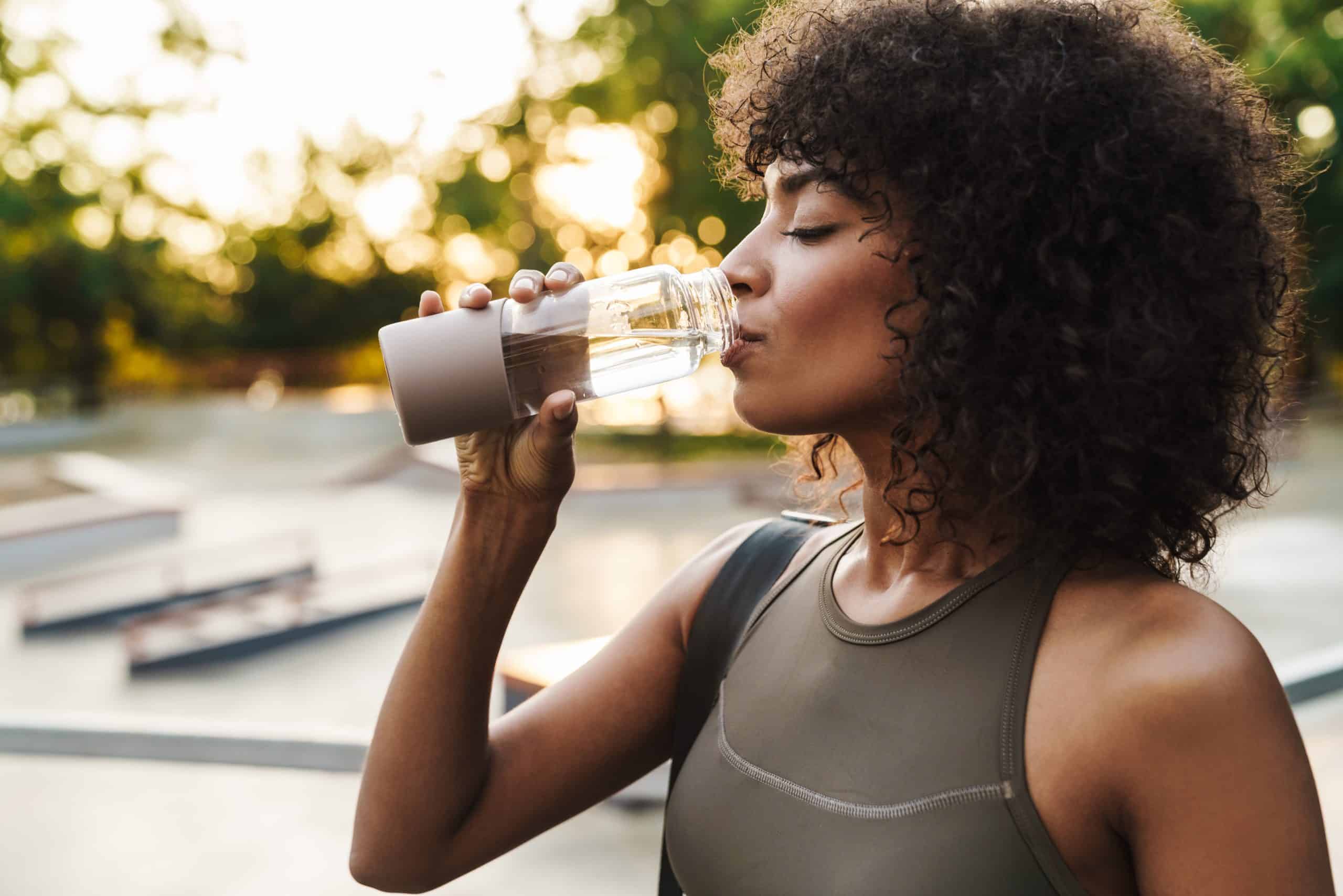Perhaps you aren’t taking in enough fluids and are wondering whether or not that can contribute to weight gain. Low fluid intake can be worsened if you’re doing a lot of exercise that’s causing you to sweat, or you’re drinking too much alcohol or drinks that have diuretic effects without replenishing. In this case, you end up losing a lot of fluids and electrolytes and become dehydrated. So, can dehydration cause weight gain? Let’s see.
Yes, dehydration can contribute to weight gain. It results in reduced metabolic rate, hormonal disruption, buildup of toxins, and feelings of hunger that cumulatively lead to weight gain.
What Is the Effect of Dehydration on Weight Gain?
Dehydration can lead to weight gain. Several studies have confirmed that when you don’t drink enough fluids or lose more than you take in, you become dehydrated and risk gaining more weight. Dehydration can lead to weight gain due to the following reasons:
- Reduced metabolic rate
- Hormonal disruption or imbalances
- Increased appetite
- Buildup of toxins
- Digestive problems
Although some people may practice dehydration to lose weight, the result isn’t long-lasting. This is because you’re only losing water weight instead of fat (4). Denying your body the fluids it needs to function properly may also negatively impact your health.
Reduced Metabolic Rate
Your body is not efficient in matters of metabolism – the body’s process of converting the food we eat into energy – when you’re dehydrated. Several studies have shown that drinking even as little as 500 ml of water has the effect of boosting your metabolic rate by approximately 30% (8).
When metabolic activity is slowed down, the process of burning calories is also slowed and the body burns fewer calories. This means more calories get stored as fat, which could result in gaining unwanted weight (11).
Hormonal Disruption
Hormones play a vital role in the body. In this particular case, one hormone that is affected by dehydration and may lead to weight gain is the hormone ghrelin. This hunger hormone increases when you’re dehydrated, in addition to increasing appetite and promoting the storage of fats. In this case, you’re likely to eat more and gain more unwanted weight (10).
Increased Appetite
It’s important to note that when you drink a lot of water before your meals, you become less hungry. This means that when you don’t take in water, your appetite for food is higher and you may consume more food than you do when well-hydrated (7). Therefore, you may end up gaining more weight when dehydrated due to eating more.
Buildup of Toxins
The build-up of toxins in the body due to dehydration may slow down metabolism. When metabolism is slowed down, more fat is likely to be stored than burned. This is because toxins may cause considerable damage to your thyroid gland, which regulates the body’s metabolic processes (6). In addition, the accumulation of toxins in the body requires some space for storage and they hold on to the fat cells, potentially leading to weight gain.
Digestive Problems
In some instances, digestive issues may cause weight gain. When the body fails to break down food properly, this leads to poor nutrient absorption, bloating and constipation, excess body fat, and inefficiency in waste and toxin processing – all of which contribute to weight gain (1).
If you’ve mustered up the courage to crush your weight loss goal, let BetterMe take the sting out of this demanding process. Our app will help you restructure your habits, remold your life and crank up your fitness results!
Can Dehydration Cause Bloating and Weight Gain?
Yes, dehydration causes weight gain and bloating. As previously mentioned, dehydration slows the process of burning calories for energy, so more is stored as fat, which leads to weight gain. Bloating also occurs when you’re dehydrated because the body is trying to retain water to restore balance (12).
Is it Hard to Lose Weight if You’re Dehydrated?
Yes, it’s harder to lose weight when you’re dehydrated. As previously mentioned, dehydration makes the body burn fewer calories than it would normally as it slows the process of metabolism. When fewer calories are burned, more is stored in the form of fat and this may result in weight gain.
In addition, when dehydrated, your appetite may increase, causing you to eat more than when hydrated. For example, when you take in more fluids such as water, you get the feeling of being full and may eat less food and vice versa. This makes it difficult to lose weight when you’re dehydrated.
How Much Weight Does a Dehydrated Person Lose?
A person who weighs 68 kgs or 150 pounds can lose approximately 0.5 to 2 kg in a fluid loss of 1 – 3% (mild dehydration) caused by normal daily activities, hot weather, or physical exercises (3). The weight you lose when you’re dehydrated is mostly water weight.
Read more: 7-Day Weight Gain Diet: Tips and Tricks to Maximize Your Gains
Why Am I Gaining Weight when Drinking More Water?
Water isn’t the only factor that affects body weight. Therefore, you need to observe other things that can cause you to hold more weight, including consuming more calories, not engaging in physical activities or exercises, and being stressed, among other factors.
It’s also possible that what you deem to be more water is simply the right amount of water that you need to drink per day. If that’s the case, you may not see a significant change in weight by sticking to water alone. In addition, the weight of water you drink can have a significant impact on the scale if you can measure it immediately – although this is temporary (5).
How Much Water Should I Drink Daily?
On average, you should drink 16 cups of water if you’re a man and 11 cups if you’re a woman (9). It’s important to note that not all of these should come from plain water as you can also get fluids from other drinks or beverages, fruits and vegetables, and coffee or tea.
The amount of water you can drink per day also depends on some of the following factors:
- Weather Conditions – during hot weather, you may sweat a lot and lose more water than when it’s cold. Therefore, you need to take in more water when you’re hot.
- Amount of Physical Activity – if you’re involved in a lot of physical activities or exercises, you lose a lot of water through sweat and need to drink more.
- Your Diet – your diet will also determine the amount of water you should consume. When you drink a lot of caffeinated drinks, this makes your body lose more water and you should drink more to replace that.
- Pregnancy – if you’re pregnant or breastfeeding, you need to drink more water as your body needs a lot of fluids to hydrate the two of you.
- Sickness – when you’re sick, you’re likely to lose a lot of body fluids due to common symptoms associated with most illnesses such as vomiting and diarrhea. Therefore, you should take more water to replenish what is lost.
BetterMe will keep you laser-focused on your weight loss journey! Nutrient-packed meal plans, fat-blasting workouts, galvanizing challenges and much more. Try using the app and see for yourself!
FAQs
Does being hydrated make you look skinnier?
Being hydrated can help with weight loss. This is because the processes of the body such as releasing toxins, digestion, and metabolism function smoothly when hydrated. In addition, being hydrated will often make you eat less while burning more calories, which may cause your body to look skinnier. However, it’s important to note that hydration isn’t the sole factor at play. To look skinnier, you may need to incorporate other strategies such as incorporating an exercise routine, achieving a daily caloric deficit, and a number of other possible lifestyle changes.
How much water weight do you lose before losing fat?
The amount of water you can lose before losing fat can vary from one person to another. Therefore, there’s no specific value to ascribe to this, but some findings show that in the first few weeks of any weight loss plan, 70% of what you lose is water, which then reduces to about 20 – 30 percent before stabilizing as the body switches to fat stores (2).
Will drinking more water help me lose belly fat?
There isn’t enough evidence to show that drinking more water can help you lose belly fat. However, drinking more water will help you keep hydrated, which promotes a healthy metabolism. This is essential for burning body fat, including the fat that has accumulated in the belly area. However, keeping hydrated isn’t the only thing you can do to lose weight as several other factors come into play, but maintaining favorable hydration status is central to the body’s ability to effectively metabolize body fat.
Does body water increase as you lose weight?
Yes, body water increases as you lose weight. During the first few weeks of your weight loss journey, your body usually loses weight, of which 70 percent is water. This leads to stress and the production of the hormone cortisol, which often leads to water retention. In this regard, the loss of water decreases as the body resorts to burning its fat stores (2).
The Bottom Line
At this point, you already know that being dehydrated can lead to weight gain. It can spur the feeling of hunger, slow down metabolic processes in the body, and lead to more toxin buildup, among other things that cumulatively lead to weight gain.
Therefore, your hydration challenge should be to drink enough water daily and keep hydrated if you want to lose weight. Of course, hydration alone may not be enough to give you the desired weight you want to achieve.
DISCLAIMER:
This article is intended for general informational purposes only and does not serve to address individual circumstances. It is not a substitute for professional advice or help and should not be relied on for making any kind of decision-making. Any action taken as a direct or indirect result of the information in this article is entirely at your own risk and is your sole responsibility.
BetterMe, its content staff, and its medical advisors accept no responsibility for inaccuracies, errors, misstatements, inconsistencies, or omissions and specifically disclaim any liability, loss or risk, personal, professional or otherwise, which may be incurred as a consequence, directly or indirectly, of the use and/or application of any content.
You should always seek the advice of your physician or other qualified health provider with any questions you may have regarding a medical condition or your specific situation. Never disregard professional medical advice or delay seeking it because of BetterMe content. If you suspect or think you may have a medical emergency, call your doctor.
SOURCES
- 6 Digestive Problems That Cause Weight Gain (n.d., brisbanelivewellclinic.com.au).
- 6 Ways to Lose Water Weight, According to Experts (n.d., menshealth.com).
- 7 Science-Based Health Benefits of Drinking Enough Water (n.d., healthline.com).
- Am I Dehydrated? (n.d., sutterhealth.org).
- Does Water Affect Weight? (n.d., military.com).
- How Toxins Contribute to Weight Gain (2017, drshel.com).
- Increasing Water Intake Influences Hunger and Food Preference, But Does Not Reliably Suppress Energy Intake in Adults (2018, pubmed.ncbi.nlm.nih.gov).
- Signs You Are Not Drinking Sufficient Water (2019, njaes.rutgers.edu).
- The Importance of Hydration (n.d., hsph.harvard.edu).
- The Link Between Dehydration and Hormone Imbalance – What You Need to Know (n.d., carolynallenhealth.com).
- The Truth About Metabolism (2021, health.harvard.edu).
- Water Weight vs. Fat: How to Tell Them Apart (n.d., healthline.com).










